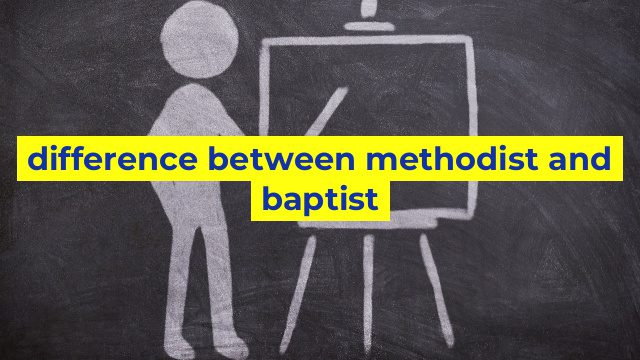Exploring the Differences Between Methodist and Baptist
The Methodist and Baptist denominations are both prominent Christian sects with unique beliefs and practices. Despite sharing many similarities, they differ on significant theological and social issues. In this article, we’ll delve deeper into these differences.
Beliefs
Methodist beliefs are based on the teachings of John Wesley, who founded the Methodist denomination in the 18th century. Wesley emphasized the importance of justification by faith, the possibility of Christian perfection, and the rejection of predestination. Methodists also believe in the Holy Trinity, the divinity of Jesus Christ, and the importance of the sacraments of baptism and the Lord’s supper.
Baptist beliefs, on the other hand, emphasize the authority of the Bible as the sole source of Christian doctrine. They believe in salvation by faith and the freedom of individual interpretation of Scripture. Baptists also reject the use of liturgy and sacraments, instead focusing on the importance of personal faith in accepting Jesus Christ as Lord and Savior.
Church Government
Methodist churches are structured around the leadership of bishops, pastors, and lay leaders who are appointed by bishops. The governing body of the Methodist Church is the General Conference, which meets every four years to make decisions on issues related to doctrine and practice.
Baptist churches, on the other hand, are congregational, meaning that each church is autonomous and independent of a denominational hierarchy. Decisions are made by the congregation as a whole, often led by a pastor or a committee of elected lay leaders.
Social Issues
When it comes to social issues, Methodists tend to be more progressive than Baptists. Methodists have historically been involved in social justice movements, including the Civil Rights Movement and the fight for marriage equality. Methodists believe in the dignity and worth of all people and work towards creating a more just and equitable society.
In contrast, Baptists tend to be more conservative in their social views. While there is no uniform Baptist stance on social issues, many Baptists hold traditional views on topics like abortion and marriage.
In conclusion, while Methodists and Baptists share many of the same basic beliefs, they differ on significant theological, church governmental, and social issues. These differences have shaped the two denominations into distinct communities with unique approaches to Christian faith and practice.
Table difference between methodist and baptist
| Methodist | Baptist |
|---|---|
| Founded by John Wesley in the 1700s in England | Founded in the 1600s in England and America |
| Believe in sanctification or the process of becoming more Christ-like | Believe in salvation or being saved through faith in Jesus Christ |
| Ordain women as ministers and pastors | Do not ordain women as ministers and pastors |
| Believe in infant baptism | Believe in believers baptism or baptism by immersion when a person is old enough to make a personal decision to follow Jesus |
| Follow a liturgical calendar with specific seasons and holy days | Do not follow a liturgical calendar |
